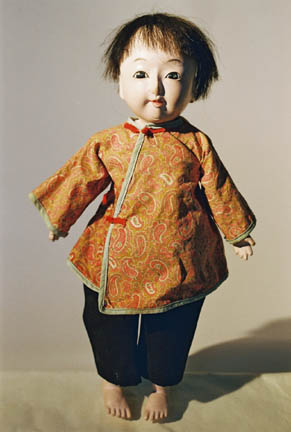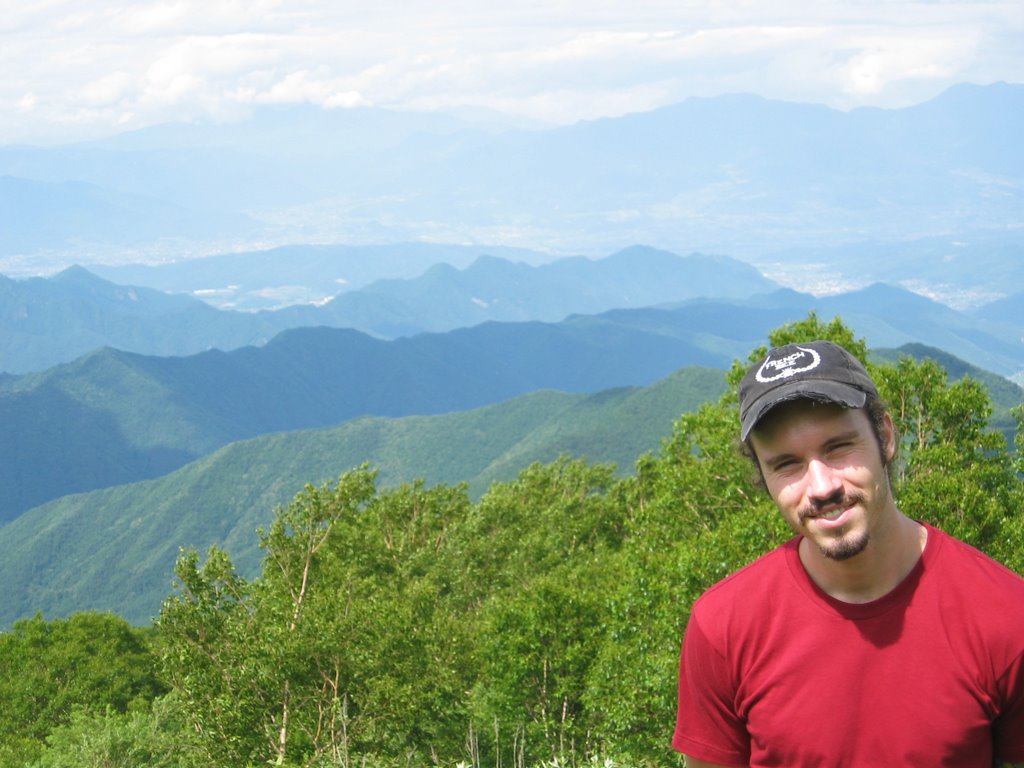 left: Small street in Kyoto**Note--The names of the people mentioned below have been changed. I thought I'd give the whole privacy thing a try on this blog for once!**
left: Small street in Kyoto**Note--The names of the people mentioned below have been changed. I thought I'd give the whole privacy thing a try on this blog for once!**When Aaron walked in, we were all sitting around the communal dinner table and mid-laugh with our faces flushed pink from alcohol. He tip-toed when he walked into the room and said hello without making much eye contact. When he sat, he rested his arms on his lap as if he were handcuffed and leaned his frail frame over the edge of the table. For a moment, the atmosphere was infused with his sobriety and awkwardness and in danger of being overrun with civility.
First, us at the table:
Marcus—a jovial Brit and veritable story machine always in the mood for a knee-slapping, eye-squinting laugh.
Lua—a gal with a laugh and smile combination that is so continuous it nearly suffocates her most of the time.
A Japanese couple—recent college grads with a shaky command of the English language but a fascination with it and the jokes its speakers told, nonetheless.
Me—later in the night, I was described as a “Yank who was actually cool.”
The table was peppered with empty beer and chu-hi cans and cups of sake that were either filled or empty. The vibe that hung above our heads and seeped out of the screen of the room’s open window was so merry that our small tatami room seemed impenetrable and sealed off from any pressure or situation that existed beyond the guesthouse walls. We were in a bubble of laughter and frozen time, and Aaron, at first, entered the room like a needle.
He had a mat of wavy, orange hair atop his head that was so bright it distracted new acquaintances to such a degree that conversing without staring was near impossible. His eyebrows and the stubble of a lazy, young goatee on his chin were also electric orange. The paleness of his freckled, white skin seemed a result of his hair demanding so much of his body’s finite supply of pigment. His eyes were small and beady, and he was as skinny as a streetlight. He wore a snug-fitting white tank top that revealed spindly arms that hung from his torso like wet fettuccine.
Realizing he wouldn’t say much more to us than a “Hey” unless he was prompted, I spoke up. “How’s it going? Andrew, nice to meet you.” I reached across the table to shake his hand. Our hands were equally small and our grips were equally strong; it felt as if my right hand was shaking my own left hand.
“Aaron. Nice to meet you. Where are you from?”
“America.”
“Ok, I thought so…from the accent. America or Canada, couldn’t tell which. I’m from Australia. Brisbane.”
We went through the usual questions foreigners ask one another when meeting in Japan:
You’re teaching English, right?
Which company?
When did you arrive?
How much longer do you think you’ll stay?
How’s your Japanese coming along?
How do you like it so far?
Is everything as you expected it to be? As the sounds of the beer and chu-hi cans hitting the table kept getting more tinny and empty-sounding, as the carton of sake kept getting lighter and easier to lift, Aaron opened up, cracked jokes, and talked to every person seated at the table.
I learned that he came to Japan 10 months ago to teach English in Tokyo. His girlfriend came out to Japan two months before he did and teaches English three-and-a-half hours away from him in Nagano City. It was her urging and assurance that gave him the confidence to come to Japan--he comes from a family and circle of friends in which traveling is a non-subject, a distraction in the post-high school path to domesticity.
When he left Australia to come to Japan, as he was about to fly on a plane for the first time and shatter his previous distance and duration records for a single trip (he admitted he had never been beyond three hours of Brisbane, and even then his longest trip lasted only four or five days), his family and friends laughed at him and told him he was crazy. The fact that he has survived in Japan for 10 months is something he is wildly ecstatic about; he has managed to silence the laughter back home.
 left: Arashiyama in Kyoto
left: Arashiyama in KyotoPeople in the room slowly and quietly fell away from the conversation to their rooms like petals of a dying flower. Only Aaron and I were left as 2:00 a.m. came and went. We were sitting at opposite sides of the table like a boss and his employee at a quarterly review. I tried to prevent the conversation from taking on the feel of an interrogation, but it was difficult because I was so curious about Aaron’s take on traveling, on life.
How often do you meet someone who, thanks to a new traveling experience, is now perched on the edge of an abyss of new perceptions of the world and is deciding whether or not to jump? I couldn’t resist grilling him.
“So, what do you think—do you feel like you might want to go and live somewhere else after Japan, somewhere other than Australia?”
“Oh definitely! Definitely. I feel almost overwhelmed by how many places there are in the world now. There are too many I want to visit, too many places I want to live.”
“Hahaha, you say '
now' like those places were not there before!?”
“Well in a way they weren’t, kinda. You know something—I had no interest in maps before I came to Japan. In Australia, a map of the world was something I was forced to look at in school in geography class. Other than that, I never looked at a world map. There was no point. I mean I would never visit all of those places anyway, right, so I didn’t give a rat’s ass about them. Now…whoah! When I look at a world map, I think about so many things.”
“Yeah I know. I feel the same way. I have a world map on my shower curtain in my apartment. When I sit on the toilet, the world map hangs to my right and I just get lost staring at the thing, dreaming. Pissing and dreaming at the same time! The ultimate release! Where do you think you’ll go after Japan? More sake?”
“Yeah, sure. Well, when we finish our contracts, we want to spend four months traveling from Beijing to Singapore. Maybe once we reach Singapore, we will fly back to Australia. But who knows. Maybe we’ll live in Singapore! Ha! Oh man, it sounds so crazy to say—
'Beijing to Singapore.' Me!? Beijing to Singapore!”
“Shhhhh! Shhhh! You’ll wake up Lua, her room is next to this one. Have you felt yourself change since you came here? I mean, obviously, your dreams have changed and what you think is possible in terms of traveling has changed. But have you felt your thoughts about other people change? What you think about people from other countries?”
“Well, kinda. At first, I was amazed by Japanese people and I thought everyone was so kind and polite and clean…and…uh, what’s the word……ahhh it's on the tip of my tongue.... oh, exotic! Yeah, everyone looked different and exotic. But, all that wore off after a few months! Ha! No, seriously, I still think that about a lot of Japanese people—the kindness and politeness and all—but I see now that they are just people, just people rushing to get to work, to feed their kids, to get married. They do all the same things we do in Australia, and in a way, I had hoped they’d be completely different from Australians. But they’re not. You know, I can get annoyed by them sometimes just like I get annoyed by Australians. So, in that sense, I feel a little let down. I thought I’d come to Japan and become so tolerant and meet people who were so different from myself, you know?”
“You honestly don’t think you’ve become more tolerant? Like, for example, if you meet a Japanese person in Singapore on the train, don’t you think you’d be more likely to try to talk to that person and learn about him or her after having lived in Japan?”
“Yeah, that’s true. But I’m also afraid I’ll look at them and think, ‘Uggh, you probably don’t think men and women are truly equal and you are probably sadly materialistic.’ I know that’s horrible, but honestly…wouldn’t you think that after living here?”
“I hear you, but regardless of what sort of stereotype you carry with you about the Japanese after you leave here, you’ll still have something to talk about, some point of connection.”
“Yeah. Hey, look, I don’t want you to think I hate Japanese people or anything. I just wasn’t plowed over with tolerance the way I thought I would be before I came. But, I mean, coming here has also allowed me to meet people like you. I mean, Jesus, if I told my buddies back home I met a Yank who was actually cool and who was planning on riding his bicycle all over the goddamn place for a year and a half or so, man they’d call me crazy. They would say, first of all, that all Yanks are bloody Bush-lovers! And then they’d say it’s impossible to ride a bicycle for that long!”
“Hahahaa. Well, it sounds like those are the types of people you need to get out here to Japan for a visit. They need to meet some cool Yanks! They need to see other countries. You could be the catalyst they need to get them out of Brisbane.”
“Yeah.” Aaron thought about just how hard it would be to get his friends out here, to entice people who are scared to travel to actually pay money to do it. He looked down at his sake cup and saw he hadn’t touched it since I filled it. He slugged the liquid back in one swig, and, because it was late and he was fueling a buzz that had already taken about all the fuel it was willing to tolerate, he cringed and shook his head as he returned the cup to the table.
I continued with the whole catalyst thing, “You know, before I came out to Japan, I told all of my friends, ‘You have to come out for a visit! You’re welcome anytime.’ When I told them that, I didn’t think many would actually come. But between my ex-girlfriend and I, we had four groups of people come out to Japan last year. I know for a fact that each group of visitors left feeling differently about Japan, feeling like they had learned a lot about a country that previously was a mystery to them. Really, try to get those guys out here, man. It would be such an awesome gift to them if you showed them around.”
“Yeah, you’re right. It would be good for them to see all this stuff I’ve been seein’…hmm…well, I’ll mention it to them, see what they say.” The shot of sake he had taken a moment before slowly rippled through his body and convinced his brain it was time for sleep. “Well man, it was good talking to you. I have to hit the sack, I’m spent.”
“Yeah, I hear you, me too. It was good talking to you.”
“Hey, you know something—even if you don’t finish your trip—hell, even if you never start it for some reason—you had the idea for it, the courage to try it. That’s so awesome. For someone like me, it’s awesome to meet people with ideas like that.” The intimacy in his words let some of the awkwardness he carried at the start of the night creep back into his posture. He slumped a bit and waved his hand back and forth as if he was buffing a car. “OK, that’s it man, I’m done for tonight. Must…get…sleep…now! Later”
“Yeah, later.”
Aaron left and I finished my sake. I felt good. I felt like I had spent the night saying meaningful things, connecting with a stranger in a positive way. Although I’m sure he never would have guessed it, Aaron, despite the fact that he had never left Australia before, inspired me to keep traveling, keep meeting new people.
Sure, he didn’t share firsthand accounts of some wild place I have never been to. He didn’t tell exciting stories about his past trips. He didn’t even ask me much about where I had been before. But he did do one thing: he reminded me that excitement, whether it be about model trains or your kids or going to the moon, is the basis of dreams. Of feeling alive. Aaron had discovered his own fresh batch of excitement and he was feeding it. Feeding it each time he opted to go out and explore Tokyo instead of stay in his apartment and loaf around, each time he researched on the Internet for his Singapore-Beijing trip, and each time he ventured into seemingly-exclusive guesthouse dinner conversations with hopes of meeting new people. He had the courage to embrace new-ness in his life, and thankfully, that courage is contagious.
 left: Mike and Patti's little man, Kaden. He really has nothing to do with this post. I'm exploiting his image here to draw people into the blog. I'm fishing for readers. When people hit that "Next Blog" button on the navigation bar at the top of a blog, if they see this cute slobbery face staring back at them, they're bound to stop and investigate. Actually, no, now that I think about it, he has a good reason to be included here: he has his own email account now! He's a member of cyberspace! And he can't even control his own shits yet!! He typed me a one-paragraph-long email yesterday. He's the smartest baby I know, for sure. Congrats Kaden!
left: Mike and Patti's little man, Kaden. He really has nothing to do with this post. I'm exploiting his image here to draw people into the blog. I'm fishing for readers. When people hit that "Next Blog" button on the navigation bar at the top of a blog, if they see this cute slobbery face staring back at them, they're bound to stop and investigate. Actually, no, now that I think about it, he has a good reason to be included here: he has his own email account now! He's a member of cyberspace! And he can't even control his own shits yet!! He typed me a one-paragraph-long email yesterday. He's the smartest baby I know, for sure. Congrats Kaden! I don’t know, but either way, I always get a laugh out of seeing this every Wednesday because I imagine what American car salesmen would say if their bosses ever tried to get them to shed their suit jackets to go pick up bubblegum and pull weeds from the sidewalk. I imagine a big ol' "FUCK NO!" would be their unanimous response.
I don’t know, but either way, I always get a laugh out of seeing this every Wednesday because I imagine what American car salesmen would say if their bosses ever tried to get them to shed their suit jackets to go pick up bubblegum and pull weeds from the sidewalk. I imagine a big ol' "FUCK NO!" would be their unanimous response.





















